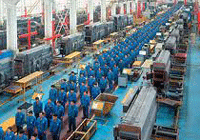
Skills gap: 10 million factory jobs vacant
Manama, May 14, 2012
The future of global manufacturing is turning into a competition for global talent with about 10 million positions currently remaining unfilled due to a growing skills gap, says a new report.
The report, The Future of Manufacturing: Opportunities to Drive Economic Growth, released by the World Economic Forum (WEF) in collaboration with Deloitte Touche Tohmatsu, said shortage is pervasive despite the high unemployment rate in many developed economies where companies are struggling to fill manufacturing jobs, such as highly trained workers and engineers.
At the same time, emerging economies cannot fuel their growth without more workers in the skilled production category, it said.
“In the race to future prosperity, nothing will matter more than talent,” says Craig Giffi, vice chairman and consumer and industrial products industry leader at Deloitte, who helped author the report.
“The skills gap that exists today will not likely close in the near future, which means companies and countries that can attract, develop and retain the highest skilled talent—from scientists, researchers and engineers to technicians and skilled production workers—will come out on top.”
“Sourcing talented human capital will be the most critical resource and top priority globally. It will act as the differentiating factor in the prosperity of countries and companies,” said Ghassan Turqieh, human capital consulting partner at Deloitte in the Middle East. “Emerging economies, such as the Middle East, cannot begin to fuel growth without the proper talent,” he added.
According to the report, innovation will play a key role in determining which countries and companies can succeed in global manufacturing looking two decades down the road.
“Companies regarded as more innovative grew net income nearly two times faster from 2006 to 2010 than their non-innovative counterparts,” said John Moavenzadeh, senior director for mobility industries at WEF.
“Meanwhile, countries that are more successful at fostering innovation performed better when it comes to both gross domestic product (GDP) and GDP per capita.”
The bottom line is that manufacturers must innovate to stay ahead of competition. They must also be enabled by infrastructure and a policy environment that better supports university and research lab breakthroughs in science and technology, the report said.
Energy consumption
The report also looked at the role energy will play in the future of manufacturing, finding that affordable clean energy strategies and effective energy policies will be a top priority for manufacturers and policymakers.
“By 2035, the US Energy Information Administration expects world energy consumption will more than double from a 1990 baseline,” says Tim Hanley, global leader for manufacturing at Deloitte.
“Manufacturers will need to seek new energy-efficient ways of manufacturing, from energy efficient product designs to more efficient production and logistics. Collaboration between manufacturers and policymakers will increasingly be an imperative to solve the global energy puzzle.”
The Future of Manufacturing report is the result of a year-long effort combining primary and secondary research, including a review of academic and industry literature, interviews with more than 30 manufacturing business, academia, and policy leaders, and virtual task force meetings. In addition, industry, policy, and academic stakeholders provided valuable input to the report during seven face-to-face global workshops.
In summarising the report, Giffi emphasizes one frequently recurring theme: Collaboration between governments and private sectors will be critical.
“With competition increasing for so many resources and capabilities—and with the prosperity of nations hanging in the balance—policymakers will be actively looking for the right combination of trade, tax, labour, energy, education, science, technology, and industrial policy levers to generate the best possible future for their citizens.” – TradeArabia News Service







